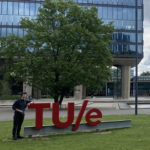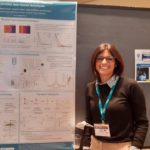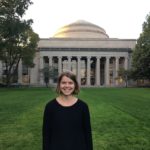Awards & Support
Excellence Awards
QCQT Excellence Awardees 2023
Nadia Antoniadis
Nadia Antoniadis from the research group of Prof. Richard Warburton receives a QCQT 2023 Excellence Award in recognition of her outstanding work “Cavity-enhanced single-shot readout of a quantum dot spin within 3 nanoseconds” and “A chiral one-dimensional atom using a quantum dot in an open microcavity”
Nam Nguyen
Nam Nguyen from the research group of Prof. Richard Warburton receives a QCQT 2023 Excellence Award in recognition of his outstanding work “Enhanced Electron-Spin Coherence in a GaAs Quantum Emitter” and “Quantum interference of identical photons from remote GaAs quantum dots”
Richard Hess
Richard Hess from the research group of Prof. Jelena Klinovaja receives a QCQT 2023 Excellence Award in recognition of his outstanding work “Trivial Andreev Band Mimicking Topological Bulk Gap Reopening in the Nonlocal Conductance of Long Rashba Nanowires”
Tobias Nadolny
Tobias Nadolny from the research group of Prof. Christoph Bruder receives a QCQT 2023 Excellence Award in recognition of his outstanding work “Macroscopic Quantum Synchronization Effects“.
QCQT Excellence Awardees 2022
- Maryse Ernzer, “Optical coherent feedback control of a mechanical oscillator”, Phys. Rev. X 13, 021023 (2023), https://doi.org/10.1103/PhysRevX.13.021023
- Paolo Colciaghi, “Einstein-Podolsky-Rosen experiment with two Bose-Einstein condensates”, Phys. Rev. X 13, 021031 (2023), https://doi.org/10.1103/PhysRevX.13.021031
- Clemens Spinnler, “Optically driving the radiative Auger transition”, Nat. Commun. 12, 6575 (2021), https://doi.org/10.1038/s41467-021-26875-8
and “Quantum interference of identical photons from remote GaAs quantum dots”, Nat. Nanotechnol. 17, 829 (2022). https://doi.org/10.1038/s41565-022-01131-2
QCQT Excellence Awardees 2021
- Frank Schäfer, “Interpretable and unsupervised phase classification”, Phys Rev Research 3, 033052 (2021), https://doi.org/10.1103/PhysRevResearch.3.033052
- Simon Svab, “Isotropic and Anisotropic g-factor Corrections in GaAs Quantum Dots”, Phys. Rev. Lett. 127, 057701 (2021), https://doi.org/10.1103/PhysRevLett.127.057701
- Natascha Hedrich, Nanoscale mechanics of antiferromagnetic domain walls”, Nature Physics 17, 574-577 (2021), https://doi.org/10.1038/s41567-020-01157-0
- Natsha Tomm, “A bright and fast source of coherent single photons”, Nature Nanotechnology 16, 399-403 (2021), https://doi.org/10.1038/s41565-020-00831-x
- Mudith Sinahl, “Quantum-nondemolition state detection and spectroscopy of single trapped molecules”, Science 367, 1213-1218 (2020), https://doi.org/10.1126/science.aaz9837
QCQT Excellence Awardees 2019
- Matthias Löbl, “Excitons in InGaAs quantum dots without electron wetting layer states”, Commun Phys 2, 93 (2019), https://doi.org/10.1038/s42005-019-0194-9
Travel Support
QCQT PhD students can apply once a year for a travel support for the attendance of a conference or research stay abroad.


The 27th International conference on Raman Spectroscopy (ICORS) took place in Long Beach (California) from August 14 to August 19 2022. The conference had the aim to bring together researchers from different fields to discuss the most recent progress and ideas in Raman spectroscopy.
As a PhD student, working on the implementation of an ultrafast Raman spectroscopy setup, this conference was particularly fruitful. The wide offer of both theoretical and experimental talks, allowed me to learn more about various aspects of this field. I had many opportunities to engage with different researchers on an international scale, from lunch breaks to the poster sessions. Regarding the latter, I had the chance to present my work on one of the conference poster sessions. I enjoyed many stimulating discussions about some challenges I am facing in my work. Those interactions were very beneficial since I had the opportunity to talk with researchers who are working on similar subjects.
Beyond the certainly fruitful scientific aspect, it was also very fun to attend to one of the conference social activities: the whale watching. It was really exciting to see whales for the first time in my life.
Finally, I would like to thank my professor Ilaria Zardo for giving me the opportunity to participate to this conference and all the founding that supported me, in particular the QCQT (Quantum Computer and Quantum Technology) school of the University of Basel.

